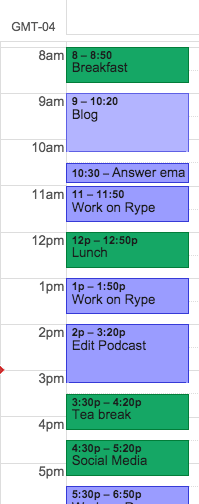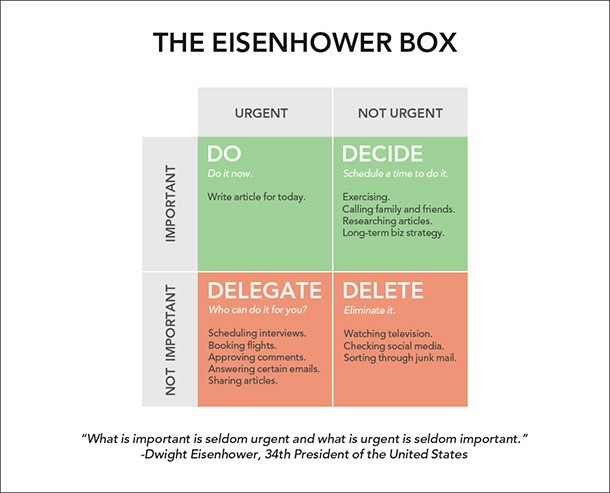Here’s 5 steps to shave more time off your “busy” schedule.
1. Track your existing schedule
If you don’t know how you spend your day already, it’s going to be very difficult to know what’s working and what’s not. This applies in any habit, result, or goal you want to change. If you’re trying to lose weight, the first thing a nutritionist will tell you is to keep track of everything you’re eating throughout the day. Start by tracking everything you’re doing during the day on your calendar. Keep it simple by categorizing each task into two colors representing:
While all of our schedules will be different, you’ll be surprised to know how much “green” space you have in our day to invest in learning or something else more productive for you. For consistency, it’s recommended to track your schedule for at least three days, since you may have had a bad or good day of productivity. This information will help you with the next step…
2. Prioritize
Now that we understand how we already spend our days, it’s time to prioritize what matters. Whether you use a to-do list or a calendar to schedule your day, try reverse-engineering your end-goal to the tasks you have set for the day. Here’s a logical framework to refer to:
What’s my ultimate goal that I am trying to achieve? (learn Spanish, increase your business revenue, etc.) Which of these tasks will bring me closer to my goal? Which of these non-impactful tasks can I outsource or eliminate completely?
From there, we’re going to borrow what a productive framework used by Dwight Eisenhower called, “The Eisenhower Box.” Start by categorizing your current task list and any upcoming ones into these 4 categories:
Urgent and important (tasks you will do immediately). Important, but not urgent (tasks you will schedule to do later). Urgent, but not important (tasks you will delegate to someone else). Neither urgent nor important (tasks that you will eliminate).
From here, you should focus only on the tasks that are in the “do” and “decide” category. Everything else, you should…
3. Eliminate
Now that you have your most impactful tasks categorized, it’s time to eliminate the unnecessary and unimportant tasks that are simply a waste of time. For many of us, this is checking social media, email, watching television, gossiping with friends, etc. After listing all of these tasks, try to experiment over the next five days without any of these, and see how much free time you have shaved off in your schedule. For tasks that may seem urgent, but not important…
4. Delegate
It’s our nature to handle every single detail of our work, but they rarely lead to moving our end-goal forward. This can be potentially dangerous, especially when we’re focused on unimportant tasks that require a lot of our time. As Gary Vaynerchuk often states, “delegating is easy when you realize that 99% of what you do doesn’t matter.” Now Gary may have a team of 500+ supporting him, but you can just as well hire a virtual personal assistant to accomplish the same tasks. You can check out websites like Upwork, Guru, or Freelancer to outsource these small, important tasks that need to be urgently completed. These tasks may include: travel research, flight booking, blog post updates, podcast editing, and more.
5. Optimize
Last, but not least, it’s time to optimize and refine your schedule to meet its full potential. Here are the 3 ways to accomplish this: i. Shorten your deadline for individual tasks As stated by Parkinson’s Law, most of us take more time than necessary to complete a task. If we give ourselves three hours to complete a small task, we’ll do our very best to use up all those three hours to complete it. However, if we only gave ourselves 15 minutes, we’ll find a way to get it done. Ask yourself: how many of the tasks on your schedule actually take up the time you allocated to it? Can you do it sooner? ii. Cut out your least important free time While we need breaks during our day, some breaks such as spending time with family is more important than watching Game of Thrones on Netflix. Find one free time in your schedule that is the least important, and cut it out from your schedule. iii. Bundle your free times together Or you can use my personal favorite option: bundling free time together. This means instead of having 2 slots of 30 minutes to check email or social media, you can simply use that first 30-minute slot to do both. Chances are, we already multi-task nearly everything we do anyways, so why not multi-task during our free times, rather than during our important tasks?
Now…it’s your turn
Which of these productive steps were your favorite? What skill will you learn after shaving off more time in your schedule? We’d love to hear from you below.

